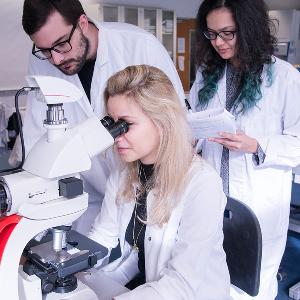Bachelor Biology


This website is currently under construction. Some functions or content may not yet be fully available or may not yet work properly. We are constantly working to improve the site - thank you for your understanding!
The introductory event for students in the first semester of the Bachelor of Biology program will take place on Monday, 29 September 2025 at 10:00 a.m. in Lecture Hall B00.019 at the Biocenter of the LMU Munich: Großhaderner Str. 2–4, 82152 Planegg-Martinsried (!). We look forward to welcoming you!
The subject of biology covers an enormous range of topics and methods. This ranges from molecular structures such as DNA and RNA to proteins and cells, from visible tissues and organs to organ systems and multicellular organisms and populations or entire ecosystems. The entire spectrum is researched at LMU on microorganisms, plants, fungi, animals and humans at various levels. Biology at LMU Munich is divided into the departments of Anthropology and Human Genetics, Evolutionary Biology, Evolutionary Biology, Genetics, Human Biology and Bioimaging, Microbiology, Neurobiology, Ecology, Plant Sciences, Systematic Botany and Mycology, Systematic Zoology / Zoology and Cell and Developmental Biology.
Biology is one of the leading sciences of the 21st century and acts as a bridge to other natural and human sciences such as medicine, physics, chemistry, geology and geography. Biology at LMU Munich is one of the largest biology faculties in Germany. Students also benefit from the close proximity to neighboring research centers of the Max Planck Institutes for Biochemistry and Neurobiology as well as the unique links with the Bavarian State Natural Science Collections and the Munich-Nymphenburg Botanical Gardens.
This page contains information on the course structure. Information on applying can be found under the heading Before your studies / Application information / Application - Pre-registration.
The Bachelor's degree program is currently offered in two examination and study regulations.
Contact person study program coordinator
Michael Bögle

© Carolin Bleese
The Bachelor's degree program in Biology provides a common education for all students during the foundation courses (semester 1 to 3), which imparts a broad foundational knowledge. In the orientation course (semesters 4 to 6), students choose between the molecular cellular, organismic, or biochemical tracks. The main language of instruction is German.
Study program overview Biology Bachelor starting from wintersemester 2020/21
| Semester | |
|---|---|
| 1. Semester | P 1: General and Organismic Biology, P 2: Molecular and Cell Biology P 3: Fundamentals of Mathematics P 4: Fundamentals of Physics P 5: Fundamentals of General and Inorganic Chemistry P 6: Methods of General and Inorganic Chemistry |
| 2. Semester | P 7: Methods of Organismic Biology P 8: Physiology P 9: Methods of Molecular and Cell Biology P 10: Analytical Methods and Mathematical Modeling P 11: Organic Chemistry P 12: Methods of Organic Chemistry |
| 3. Semester | P 13: Fundamentals of Ecology, Behavioral and Evolutionary Biology P 14: Methods of Physiology P 15: Biomolecules P 16: Computer and Programming Skills P 17: Physics P 18: Physical Chemistry |
| 4. Semester | P 19: Integrative Biology P 20: Statistics Two elective modules (specializations can be chosen) |
| 5. Semester | P 21: Exprimental design Four elective modules (specializations can be chosen |
| 6. Semester | P 22: Final module and Bachelor's thesis Five elective modules |
| Electible modules in the fourth semester In the 4. semester two modules from following courses can be chosen | Electible modules in the fifth semester In the 5. semester four modules from following courses can be chosen |
|---|---|
| - Focus zoology 1 - Focus biodiversity botany - Focus biodiversity zooglogy - Focus molecular and experimental evolutionary biology - Focus comparative field ecology - Focus microbial and plant phyiology - Focus neuobiology - Focus genetics - Focus micobial and plant cellular biology - Focus computational biology 1 | -Focus anthropology -Focus organismic biology -Focus zooglogy 2 -Focus botany and mycology -Focus experimental and comparative ecology -Focus systematics, ecology and evolutionary biology -Focus human biology -Focus biochemistry -Focus biophysics -Focus molecular plant sciences -Focus cellular and developmental biology -Focus animal cell biology -Focus animal physiology -Focus computational biology 2 -Focus interdisciplinary aspects of biology |
| Electible modules in the sixth semester In semester 6. one module from following courses can be elected | And four other events |
|---|---|
| - Extension organismic biology - Extension molecular and cellular biology - Extension physiology or - Extension computational biology | which can be maxmial two lectures, two seminars, two practicals and/or two career qualifying events. Numerous lectures are offered to deepen the various areas of focus. |

© LMU
The Bachelor's degree program in Biology provides a common education for all students during the foundation course (semesters 1 to 4), which imparts a broad foundational knowledge. In the orientation course (semesters 5 and 6), students choose between the molecular cellular, organismic, or biochemical tracks. The main language of instruction is German.
| Foundation studies | Orientation studies In the fifth semester students choose 5 modules from the following course types: |
|---|---|
| 1. Semester: zooglogy, botany as well as anorganic chemistry, mathmatics and physics 2. Semester: Course in botany and zoology as well as organic chemistry and phsics 3. Semester: Basics in biochemistry, microbiology, genetics and human biology as well as physical chemistry and physics 4. Semester: basics in animal physiology, ecology, evolution, cellular biology as well as mathmatics |
|
Irini Bassios
LMU Munich | Faculty of Biology
Großhaderner Straße 2 | 82152 Planegg-Martinsried
Room G 00.045 | Phone +49 89 2180 74226
Email: bachelor@bio.lmu.de
Office hours
Mo: 09:00 – 10:00 (presence) and 10:00 – 11:00 (online)
Fr: 09:00 – 10:00 (presence) and 10:00 – 11:00 (online)
No office hours on following days: 29.09.2025
Zoom link
Exchange and Erasmus students
Dr. Michael Bögle
LMU Munich | Faculty of Biology
Großhaderner Straße 2 | 82152 Planegg-Martinsried
Room G 00.045 | Phone +49 89 2180 74226 or 74222
Email: exchange@bio.lmu.de
Office hours:
Fr: 11:00 - 12:00 (online und presence)
Link für Onlinesprechstunde
Guidelines for writing a Bachelor thesis from 01.08.2024 (PDF, 205 KB)
Guidelines for writing a Bachelor thesis before 01.08.2024 (PDF, 180 KB)
Guidelines for the use of AI at the Faculty of Biology (PDF, 58 KB)
Registration of a Bachelor's thesis WITHIN the Faculty (PDF, 425 KB)
Registration of the Bachelor's thesis OUTSIDE the faculty (PDF, 437 KB)
AI- Declaration of independence (PDF, 52 KB)
Submission of the Bachelor's thesis- details on the thesis, last page (PDF, 16 KB)
Application for extension (PDF, 83 KB)
Dates: start and submission Bachelor theses 2025_26 (PDF, 426 KB)